1803

The Senate and House approved the Louisiana Purchase, acquiring nearly 800,000 square miles of land extending from the Mississippi River to the Rocky Mountains, including the future state of Kansas.
1854
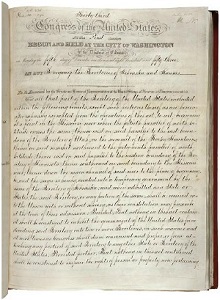
After five months of acrimonious debate, the Senate passed the Kansas-Nebraska Act, dividing the Nebraska Territory into the Kansas Territory to the south and Nebraska to the north. The act allowed the people of both territories to decide whether to permit or prohibit slavery. President Pierce signed the act into law on May 30.
1856
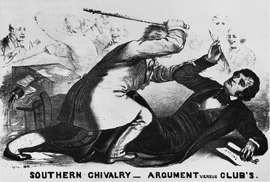
During Senate debate on Kansas statehood, Senator Charles Sumner, a Free Soil advocate from Massachusetts, delivered his “Crime Against Kansas” speech, denouncing the Kansas-Nebraska Act and insulting several senators by name, including South Carolina senator Andrew Butler. In response, four days later, South Carolina representative Preston Brooks, a relative of Butler's, beat Sumner with a cane while the senator was seated in the Senate Chamber.
1857
Kansas citizens elected a free-state legislature.
1858
Citizens of the Kansas Territory rejected the Lecompton Constitution which would have allowed slavery in the state of Kansas.
1859
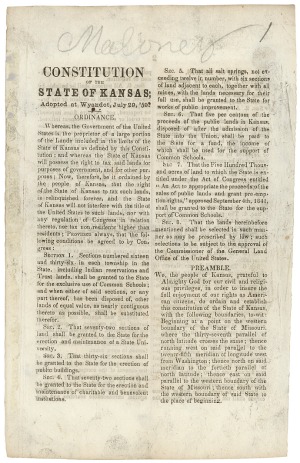
In the fourth attempt to draft a state constitution, delegates in Wyandot wrote a free-state constitution and petitioned Congress for admission to the Union.
1861
The Senate approved the Wyandot constitution. The President signed the act on January 29 and Kansas became the 34th state in the Union.
1861

James H. Lane of Lawrence and Samuel C. Pomeroy of Atchison took their seats as Kansas’ first two senators. Class selection was determined by lot, with Lane drawing a four-year term and Pomeroy drawing a six-year term.
1868
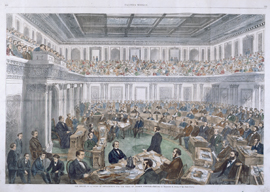
During the impeachment trial of President Andrew Johnson, Edmund Ross was one of seven Republican senators who courageously defied their party's leadership and voted with the 12 Democratic senators to acquit the president.
1872

The Kansas legislature submitted its findings in an investigation of Samuel Pomeroy’s 1867 election and Alexander Caldwell’s 1871 election to the Senate’s Committee on Privileges and Elections. The findings suggested that both senators had used money to secure votes. Pomeroy lost his bed for another term in the 1872 November election. Caldwell resigned his seat on March 24, 1873, before the Senate could act.
1880

Following an investigation into charges of bribery and corruption in the 1878 election of Senator John J. Ingalls of Atchison, the Senate found no evidence that Ingalls was involved in such activities and voted that he should retain his seat.
1887
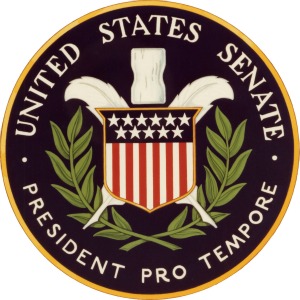
Senator John J. Ingalls was elected president pro tempore of the Senate, a position he held intermittently through 1891.
1888
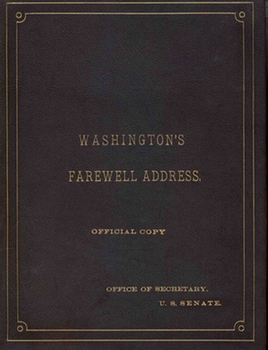
Senator John J. Ingalls delivered George Washington's 1796 Farewell Address to the U.S. Senate. The practice, which had originated in 1862, went on to become an annual Senate tradition.
1895

The contested election of John Martin of Topeka was resolved when Vice President Adlai Stevenson ruled on a point of order that a resolution that declared Kansas had not properly organized legislature at the time of Martin's election was not privileged and could not be considered.
1905
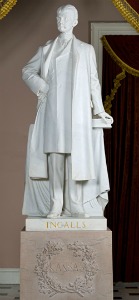
A marble statue of John J. Ingalls, sculpted by Charles H. Niehaus was unveiled at the Capitol, becoming Kansas’s first contribution to the National Statuary Hall Collection.
1906
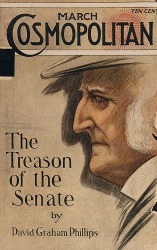
The Supreme Court upheld the conviction of Senator Joseph R. Burton of Abilene on the charge of receiving compensation for services rendered before a federal department. Burton resigned on June 4, 1906, before the Senate took any action. Burton’s case was part of the inspiration for the series of articles titled “Treason of the Senate” that appeared in Cosmopolitan Magazine beginning in February 1906.
1911

Charles Curtis was elected president pro tempore of the Senate. He held the post until Jan. 15, 1912.
1914
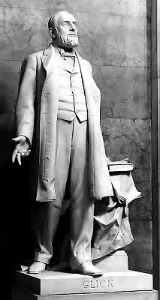
A marble statue of George W. Glick, sculpted by Charles H. Niehaus, was unveiled at the U.S. Capitol, becoming Kansas’s second contribution to the National Statuary Hall Collection. Lawyer, farmer, and former governor of Kansas, Glick helped draft the free-state constitution that allowed for Kansas’s admission to the Union.
1914
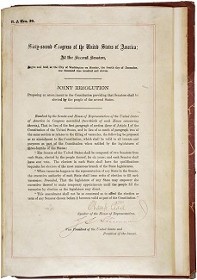
Charles Curtis became Kansas's first directly elected senator under the terms of the Seventeenth Amendment, which had been adopted on April 8, 1913. Ironically, in the Republican primary Curtis had defeated Joseph L. Bristow of Salina, who had introduced the resolution that led to the Seventeenth Amendment.
1921
Charles Curtis became chairman of the Senate Committee on Rules and Administration, a position he held until 1929.
1924
Senate Republicans elected Charles Curtis chairman of the Republican Conference, a position he held until March 3, 1929.
1925
The Republican Conference elected Chairman Charles Curtis as its first official floor leader, making him the Senate majority leader, a position he held until March 3, 1929.
1929
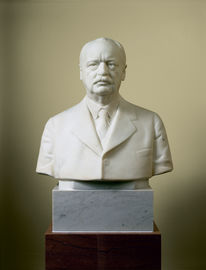
Charles Curtis presided over the Senate as the 31st vice president of the United States, a position he held until March 3, 1933.
1947

Arthur Capper of Topeka became chairman of the Senate Committee on Agriculture and Forestry (today's Committee on Agriculture, Nutrition, and Forestry), a position he held until 1949.
1949
Arthur Capper ended his Senate career having served for 29 years, 9 months, and 30 days. He holds the record as Kansas's longest-serving senator.
1969
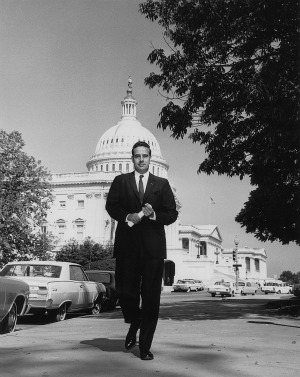
Robert J. Dole of Russell began his Senate career. Dole lost the use of his right arm from wounds sustained in Italy during World War II.
1981

Robert J. Dole became chairman of the Senate Committee on Finance, a position he held until 1984.
1985
The Republican Conference elected Senator Robert J. Dole as their floor leader. He served as majority leader until January 3, 1987, when the Democrats took control of the Senate. He served as minority leader until his resignation on June 11, 1996.
1995

Nancy Landon Kassebaum of Wichita, who became Kansas' first woman senator in 1978, became chair of the Committee on Senate Labor and Human Resources (today's Committee on Health, Education, Labor, and Pensions). Daughter of former Kansas governor Alfred M. Landon, Kassebaum became the first woman senator to chair a committee in 40 years.
1996
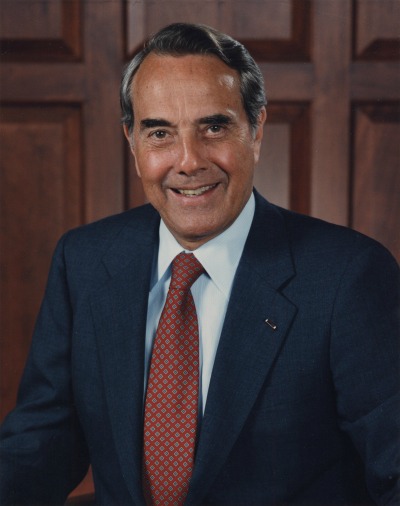
Republican Leader Robert J. Dole resigned to run for president of the United States. He was nominated by his party in August 1996. Dole and his running mate, Jack Kemp, lost to incumbents President Bill Clinton and Vice President Al Gore
1997
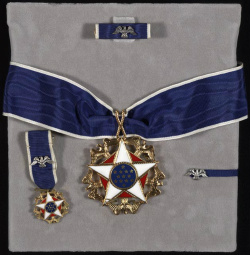
Former senator Robert J. Dole was awarded the Presidential Medal of Freedom, the highest civilian award of the U.S. government. Honorees are selected solely by the president, and their accomplishments are in wide-ranging fields, including public service, journalism, entertainment, sports, and business.
2003

Patrick Roberts of Dodge City became chairman of the Senate Permanent Select Committee on Intelligence, a position he held until 2007.
2003
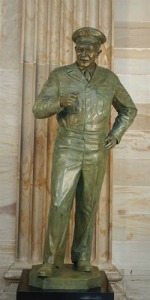
A bronze statue of President Dwight D. Eisenhower by Jim Brothers became Kansas’s third contribution to the National Statuary Hall Collection. Eisenhower replaced the marble statue of George W. Glick. Kansas became the first state to replace a statue in the collection.
2006
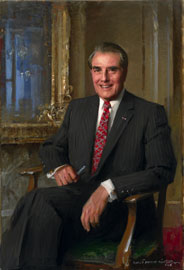
A portrait of former Senate Republican leader Bob Dole was unveiled in the Old Senate Chamber as part of the U.S. Senate Leadership Portrait Collection.
2009
Pat Roberts served as Senate Teller for Counting Electoral Ballots. This position came from his ranking member status on the Senate Committee on Rules and Administration.
2010

Senator Sam D. Brownback of Topeka, who had defeated appointed senator Sheila Frahm of Colby in the special election to replace Bob Dole in November 1996, was elected governor of Kansas. Brownback had decided not to be a candidate for reelection to the Senate.
2015
Pat Roberts became chairman of the Senate Committee on Agriculture, Nutrition, and Forestry, a position he held until his retirement on January 3, 2021.
2020

Jerry Moran of Manhattan became chairman of the Senate Committee on Veterans' Affairs, a position he held until 2021. He again became chairman on January 7, 2025.
2022
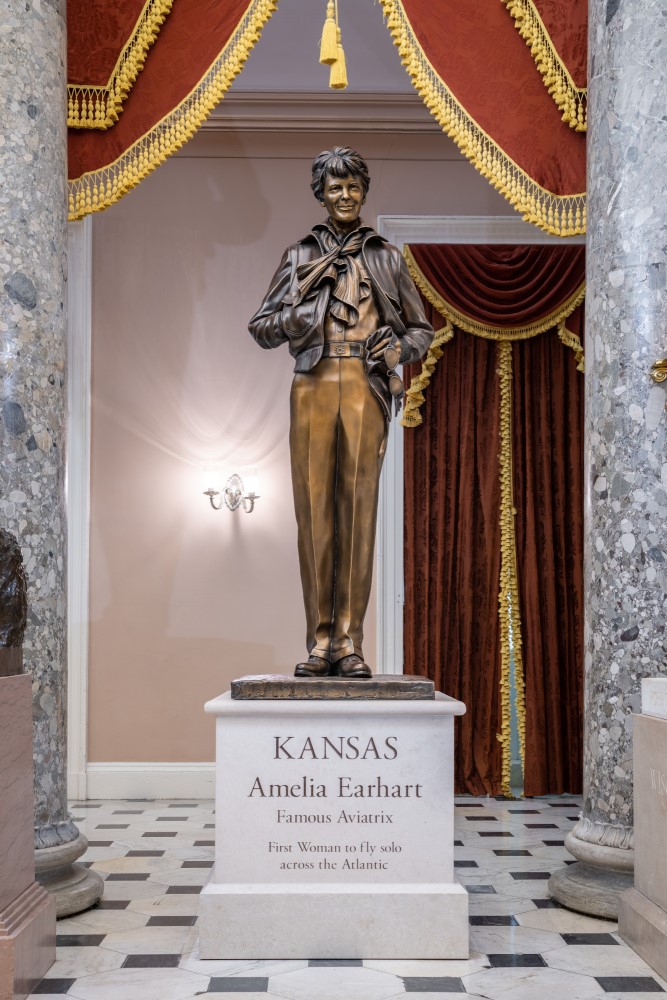
A bronze statue of Amelia Earhart by George and Mark Lundeen was unveiled at the Capitol as part of the National Statuary Hall Collection. Earhart replaced the marble statue of John J. Ingalls unveiled in 1905.